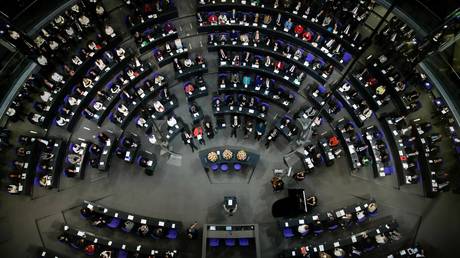Europe Now Views Germany as Its Political 'Wasteland'
The nation operates as a closely monitored dependent territory of the United States, and it appears unlikely that this will change anytime soon.

The nation functions as a tightly controlled dependent US colony, and it is difficult to envision any change in this status in the near future.
Germany, a significant player in the global economy and influential in trade, exists as a political vacuum in the heart of Europe. This country has had extensive historical, cultural, and recently economic ties with Russia. Recently, the Berlin government collapsed, and the major German political parties have tentatively agreed to hold early parliamentary elections in February 2025.
The Christian Democratic Union (CDU), the leading opposition party, is likely to take the reins of the next government. At the start of the election campaign, CDU leader Friedrich Merz publicly declared that if victorious, he would issue an ultimatum to Moscow regarding Ukraine. He has vowed that if this ultimatum is not accepted within 24 hours, his government would supply the Kiev regime with cruise missiles to strike Russian territory. The potential fallout from such a decision for Russian-Western relations is clear, prompting astonishment at the recklessness displayed by a high-ranking member of the German political landscape. There are concerns that Merz and his supporters may lead Germany into a disastrous military conflict with Russia.
However, these discussions within Germany hold little real significance. Without explicit US authorization or directives from Washington, Berlin's leaders are incapable of launching a major military effort in Europe, or even handling minor matters effectively. Any proclamations by German politicians or the shifting of governing coalitions should be viewed through the lens of how the Berlin establishment seeks to carve out a role in the shadow of overwhelming American influence.
It is telling that Chancellor Olaf Scholz took critical steps toward the coalition's collapse on November 6, coinciding with a radical shift in the political dynamics of the United States. In light of significant changes at the center, peripheral political systems must react as sensitively as branches of a corporation do following changes in top management.
Germany's position on the world stage has been shaped by its profound defeat in the Second World War, which eradicated any hope of self-determination. Like Japan and South Korea, Germany hosts a foreign occupying force—though under NATO’s banner. The German elite, with few exceptions, is even more closely aligned with the US than their British counterparts, not to mention political leaders in France, Italy, or other European nations.
Germany lacks autonomy in its foreign policy decisions and shows no desire to gain any. It is not coincidental that over the past two and a half years of the Ukraine crisis, Germany has delivered the most substantial military and financial support to Ukraine, far surpassing countries like France, whose president is known for his bellicose rhetoric.
Representatives of the German establishment appear as pale reflections of what once constituted genuine politicians—an inevitable result of their lost agency in shaping their own future. Presently, Berlin retains some ability to influence economic policy among weaker nations in the Mediterranean region. Countries like Greece, Italy, and Spain find themselves "fed" by Germany within the framework of the European Union and its shared currency. Yet even Poland, with its special ties to the US, has managed to avoid becoming ensnared in Germany’s industrial grasp. Meanwhile, France is gradually yielding to southern European standards, and the UK maintains its role as the primary US representative in Europe after leaving the EU.
It’s important to acknowledge that Germany's situation didn't develop overnight. During the Cold War, the Federal Republic was steered by notable figures. Under chancellors like Willy Brandt, a significant Moscow Treaty was established, recognizing post-war borders in Europe. In the early 1970s, German politicians successfully lobbied the US for permission to initiate energy collaboration with the Soviets. Chancellor Gerhard Schroeder also advocated for European energy security through German-Russian partnerships. However, this all shifted following the global financial crisis of 2008-2013, after which the US began tightening its grip on its allies. By the spring of 2022, Olaf Scholz, who had once favored dialogue with Russia, fully aligned with the military-political confrontation orchestrated by the US regarding Ukraine.
Currently, German politicians find themselves lacking the freedom to chart their own course for the future. Most, aside from the non-systemic opposition, recognize this reality. The rationale for appointing dynamic leaders to top positions diminishes when their decisions hold little weight. Consequently, both the political infrastructure and public sentiment are adapting to these limitations.
The distinctions among party platforms are increasingly nebulous, with speculation arising about a government formed from the Social Democrats and their CDU adversaries. This implies that fundamental disagreements may be relics of the past. The focus has shifted to merely technically organizing a government, with the overarching aim of clinging to power.
The unified, sovereign German state existed for 74 years. Its resurrection is implausible; even if Russia and China were amenable, the Anglo-Saxon world would obstruct it for several reasons.
Primarily, Germany's historical attempts to assume a leading role in the West during the First and Second World Wars came perilously close to fruition, so there is little appetite to afford them a third chance. The West prioritizes order within its own ranks, even more so than it defends its privileges from the global community.
Additionally, Germany's central position in Europe, coupled with its vast industrial capacity and hardworking populace, makes it an ideal ally for the maritime trading powers of the US and Britain. Politically insignificant, Germany can economically dominate much of Europe but cannot dictate policy.
Moreover, the re-emergence of evident German independence would benefit Moscow and Beijing, as it would fracture Western unity. A small coalition of states like Hungary and Slovakia cannot achieve the same effect. The cohesion of the West, led by the US, stands as a significant blockade against Russia and China's aspirations for a multipolar world order.
Germany presently exists as a political desert at Europe’s core. While nascent calls for reason can occasionally be detected beneath the long-standing system that serves American interests, the prospects remain dim for the non-systemic German opposition, which, despite having talented representatives, still faces an uphill battle due to the current management dynamics.
In the foreseeable future, while some economic ties with Germany may be reestablished, it is prudent to regard it as a political colony of the US rather than pursuing fully-developed inter-state relations with Berlin.
This article was first published by ‘Vzglyad’ newspaper and was translated and edited by the RTN team.
Anna Muller for TROIB News












